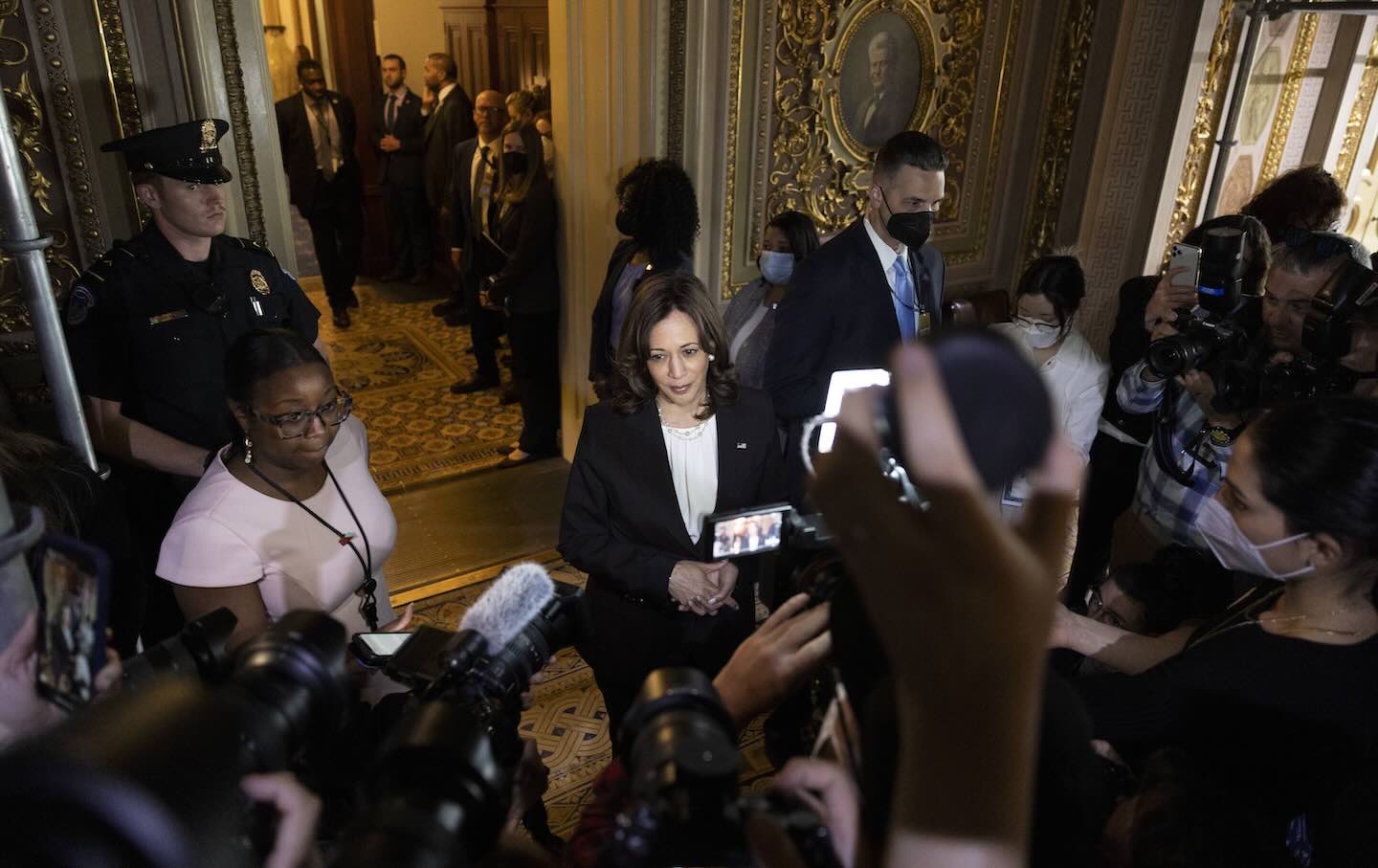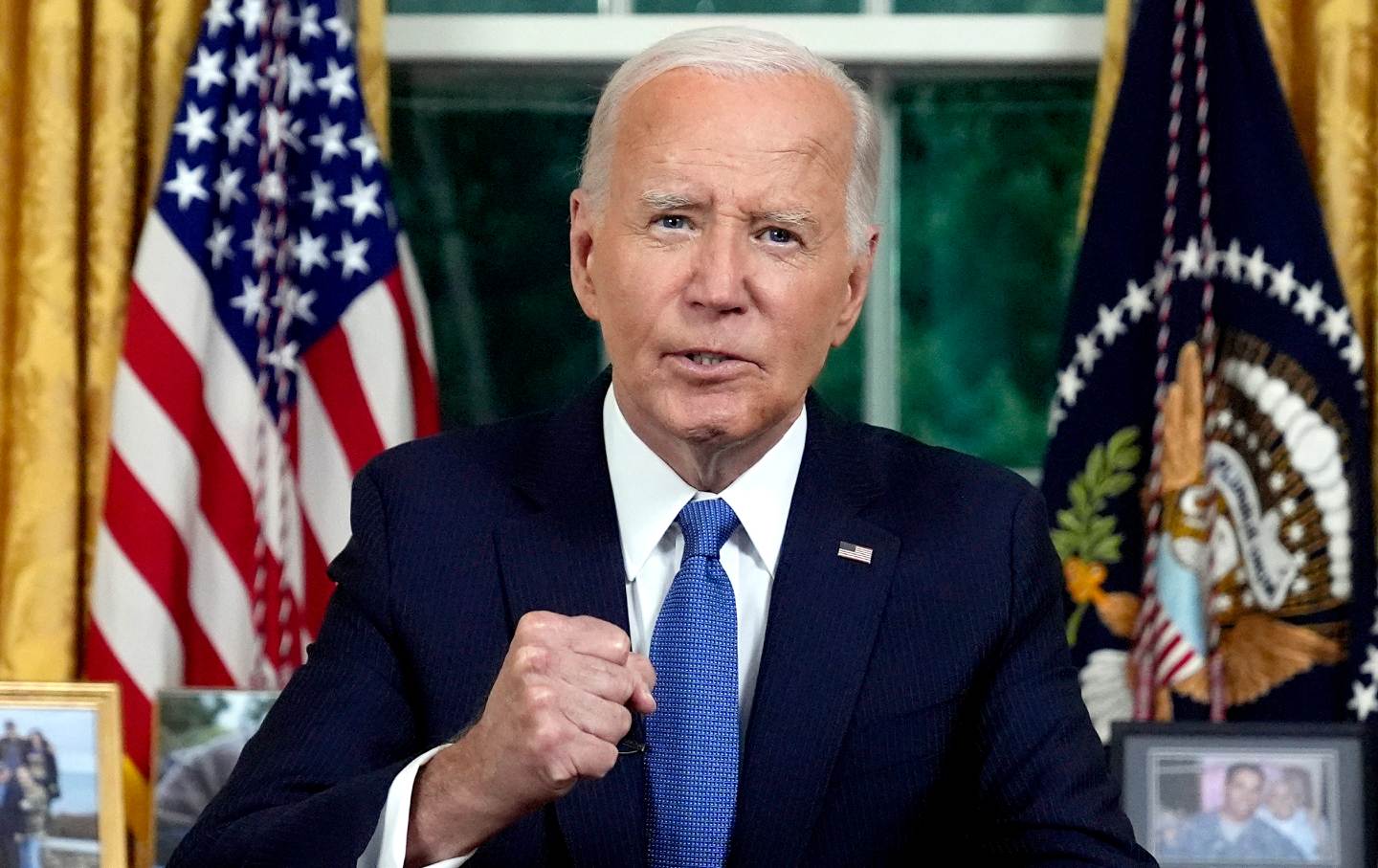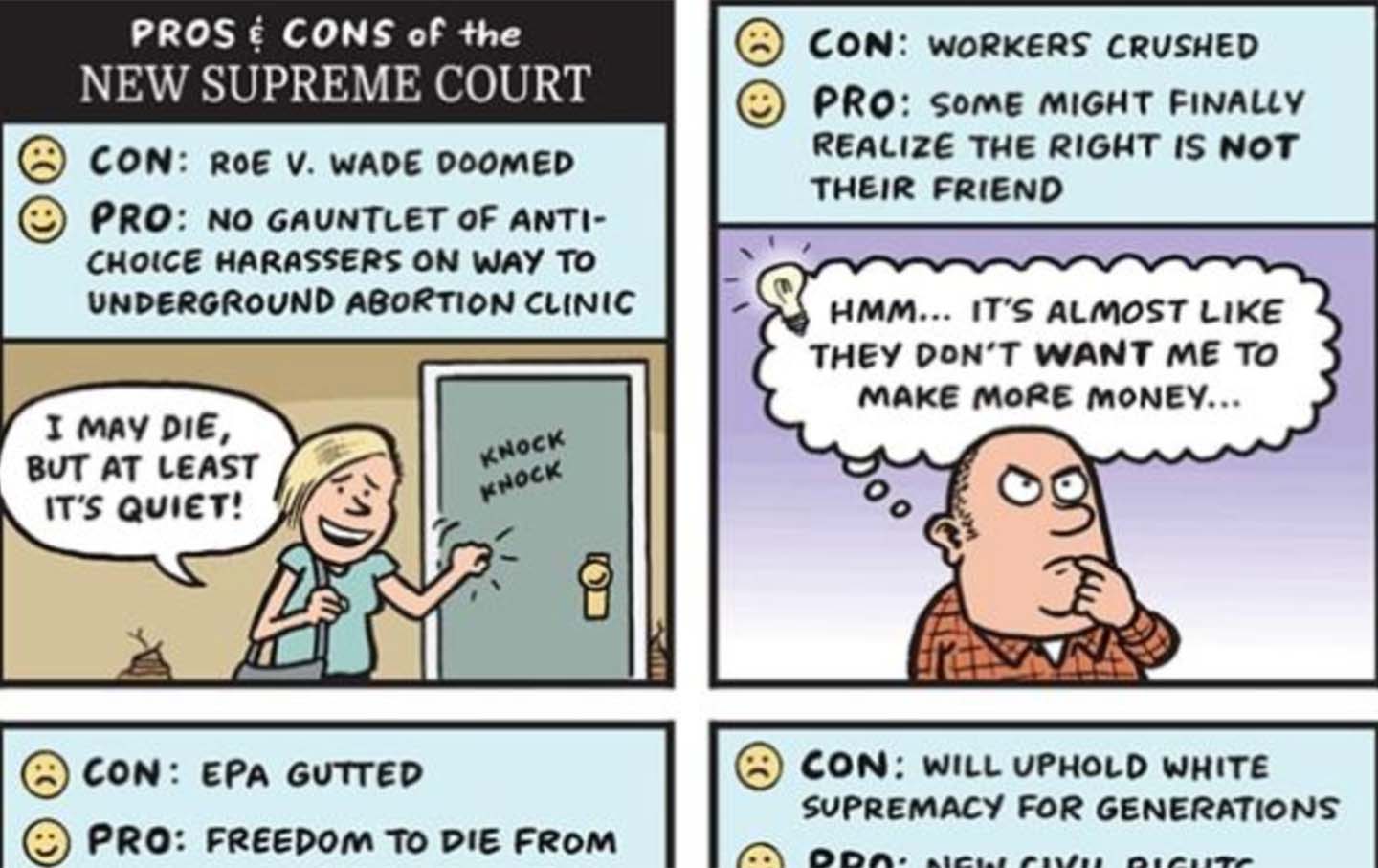The Only Way Trump Stays on the Ballot Is if the Supreme Court Rejects the Constitution
It’s simple: Amendment 14, Section 3 bars Trump from the ballot. The question today is whether the justices will accept this reality.

Former US president Donald Trump departs after attending the civil fraud trial against the Trump Organization in New York State Supreme Court, in New York City on January 11, 2024.
(John Lamparski / AFP via Getty Images)The US Supreme Court faces a simple question when it comes to today’s hearing on whether Donald Trump’s name should appear on primary and general election ballots this year: Is Trump constitutionally qualified to seek and hold the office of the presidency?
The answer to that question—if the justices honestly interpret the clear language of the United States Constitution—is equally simple: No.
The nation’s founding document outlines a series of qualifications for Americans who endeavor to obtain the presidency. They are not all found in one place. Rather, the requirements are spread throughout the document: some at the beginning where the framework of the federal government was spelled out, and others added as circumstances demanded.
Most Americans are aware that Article II, Section 1, Clause 5 of the Constitution declares, “No Person except a natural born Citizen, or a Citizen of the United States, at the time of the Adoption of this Constitution, shall be eligible to the Office of President; neither shall any Person be eligible to that Office who shall not have attained to the Age of thirty five Years, and been fourteen Years a Resident within the United States.”
But there are other requirements. Section 1 of the 22nd Amendment establishes a term limit for presidential candidates. stating, “No person shall be elected to the office of the President more than twice, and no person who has held the office of President, or acted as President, for more than two years of a term to which some other person was elected President shall be elected to the office of the President more than on.”
And, of course, Section 3 of the 14th Amendment—which the court will be considering today—bars insurrectionists and their supporters from holding positions of public trust: “No person shall be a Senator or Representative in Congress, or elector of President and Vice-President, or hold any office, civil or military, under the United States, or under any State, who, having previously taken an oath, as a member of Congress, or as an officer of the United States, or as a member of any State legislature, or as an executive or judicial officer of any State, to support the Constitution of the United States, shall have engaged in insurrection or rebellion against the same, or given aid or comfort to the enemies thereof.”
Only if Congress votes by a two-thirds majority to lift the ban can an individual who has so violated his or her oath of office again serve, according to the clearly defined dictates of the amendment.
The work of interpreting these constitutional requirements does not have to be complicated.
For instance, the name of US Representative Maxwell Alejandro Front, the Florida Democrat who is the youngest member of Congress, cannot be placed on a presidential ballot this year because, at 27, he does not meet the age requirement. No congressional resolution or court ruling is necessary to settle the issue. Reality is sufficient.
The name of Barack Obama cannot be placed on a presidential ballot this year because, as someone who has already served two full terms in the Oval Office, he is not allowed to bid again. No congressional resolution or court ruling is necessary to settle the issue. Reality is sufficient.
Similarly, any good-faith reading of the Constitution would show that the name of Donald Trump cannot be placed on a presidential ballot this year because, as the bipartisan Select Committee to Investigate the January 6th Attack on the United States Capitol determined, “President Trump or his inner circle engaged in at least 200 apparent acts of public or private outreach, pressure, or condemnation, targeting either State legislators or State or local election administrators, to overturn State election results.” No congressional resolution or court ruling is necessary to settle the issue. Reality is sufficient.
As US Representative Jamie Raskin, the constitutional law professor who served as a member of the January 6 committee, points out with regard to the 14th Amendment, “The language is totally plain. If you’ve sworn an oath to support the Constitution and you violate that oath by engaging in insurrection or rebellion, you can never hold office again, unless the Congress votes by a two-thirds margin to essentially reinstate your eligibility. That’s what the Constitution itself says.”
Lawyers on both sides of the issue will, undoubtedly, go into considerable detail during today’s Supreme Court hearing on Trump’s appeal of a ruling by the Colorado Supreme Court that declared him ineligible to appear on that state’s 2024 presidential ballot.
It is expected that Trump’s legal representatives will roll out the fantastical argument that, because the amendment does not mention the presidency, it does not apply to Trump—as if it the framers of the amendment, which was written with the initial goal of barring those who supported the 1861–65 Confederate rebellion against the United States from holding office in the post–Civil War era, intended to carve out an exception for former Confederate States of America president Jefferson Davis. (In an 1868 court trial, Davis’s own lawyers filed an affidavit acknowledging that he had sworn an oath to the Constitution in 1845, which, an analysis published by the National Constitution Center explained, “placed him within Section 3’s disqualification.”)
Trump’s lawyers are also expected to argue that an insurrectionist must be convicted in the courts or by Congress to be disqualified—as if a 27-year-old like Frost could mount a presidential bid as long as he weren’t convicted of underage campaigning. Lawyers with the Citizens for Responsibility and Ethics in Washington have explained in briefs for cases involving efforts to remove Trump from state ballots:
Both the Fourteenth Amendment’s text and Supreme Court precedent confirm that Section 3 is self-executing and can be enforced without federal legislation. Under the Supremacy Clause of the Constitution, state courts must enforce Section 3 where state law allows, and historically state courts have done exactly that. The Supreme Court has also consistently held the substantive provisions of the Reconstruction Amendments—including the Fourteenth Amendment—to be self-executing. Supreme Court precedent also makes clear that congressional action cannot be required to activate Section 3.
Today’s Supreme Court hearing will uncork plenty of partisan punditry and positioning. But legal scholars recognize the issue at hand as a question of whether the court is prepared to embrace “a very straightforward textualist application of the Constitution,” as conservative judges are always saying they do.
Popular
“swipe left below to view more authors”Swipe →“This is a chance for these justices to show that they really mean it when they talk about textualism, when they talk about originalism. The plain text of the Constitution could not be any clearer,” Raskin—who was a professor of constitutional law at American University’s Washington College of Law for more than 25 years before his election to the House—told CNN in December.
Of course, textualism does not always rule the day on the current high court. In fact, the safest bet is that this court, with its supermajority of Republican-appointed justices—three of them picked by Trump himself—and a history of blatantly partisan conflict of interest scandals, will bow to the demands of the party’s presumptive 2024 presidential nominee.
But they do not have to do so, says Raskin. They could recognize the reality of the situation: “If Donald Trump is not disqualified from holding office again after what he did on January 6 and in the weeks leading up to it, then who is disqualified? Why would they read an entire provision out of the Constitution?”
As the House’s preeminent constitutional scholar says, “This is their opportunity to behave like real Supreme Court justices.”
Thank you for reading The Nation
We hope you enjoyed the story you just read, just one of the many incisive, deeply-reported articles we publish daily. Now more than ever, we need fearless journalism that shifts the needle on important issues, uncovers malfeasance and corruption, and uplifts voices and perspectives that often go unheard in mainstream media.
Throughout this critical election year and a time of media austerity and renewed campus activism and rising labor organizing, independent journalism that gets to the heart of the matter is more critical than ever before. Donate right now and help us hold the powerful accountable, shine a light on issues that would otherwise be swept under the rug, and build a more just and equitable future.
For nearly 160 years, The Nation has stood for truth, justice, and moral clarity. As a reader-supported publication, we are not beholden to the whims of advertisers or a corporate owner. But it does take financial resources to report on stories that may take weeks or months to properly investigate, thoroughly edit and fact-check articles, and get our stories into the hands of readers.
Donate today and stand with us for a better future. Thank you for being a supporter of independent journalism.
More from The Nation

Working Families Party Nominates Kamala Harris Ahead of the DNC Working Families Party Nominates Kamala Harris Ahead of the DNC
The nomination gives the presumptive Democratic presidential nominee a second ballot line in New York and a big organizational boost from WFP and its allies.

Kamala Harris Is Ready for This Fight Kamala Harris Is Ready for This Fight
In a matter of days, Vice President Kamala Harris cleared the path for the Democratic presidential nomination.
Editorial / John Nichols for The Nation

J.D. Vance’s Hatred of Cat Ladies Is Weirder and More Dangerous Than You Think J.D. Vance’s Hatred of Cat Ladies Is Weirder and More Dangerous Than You Think
Patriarchy, plutocracy, and ethnonationalism fuel the vice-presidential candidate’s bizarre slur.

What I Learned Covering Attorney General Kamala Harris What I Learned Covering Attorney General Kamala Harris
Since her time as California attorney general, Vice President Kamala Harris has proven to be a tough-as-nails negotiator.

Joe Biden Bids Farewell Joe Biden Bids Farewell
Wednesday night’s address was moving, and also confirmed that he’d made the right decision.



